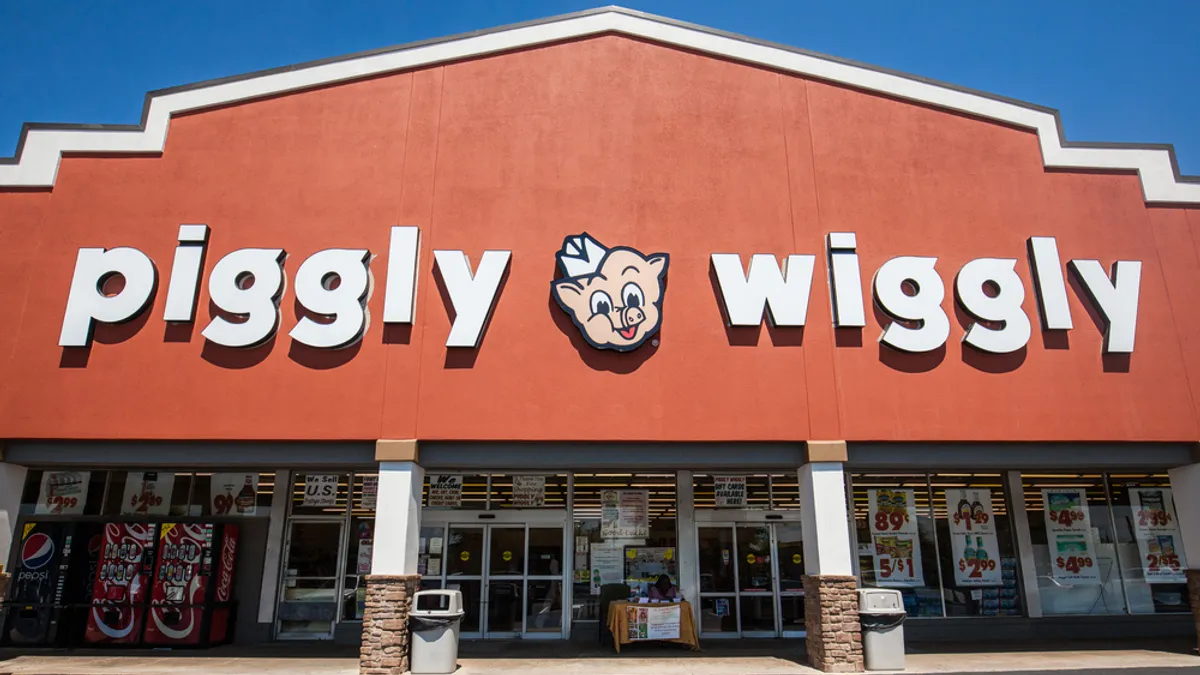Dive Brief:
- Piggly Wiggly stores in the South and the Upper Midwest have remained steady operators despite heated competition from Walmart and other retailers, according to Supermarket News. Piggly Wiggly Alabama president David Bullard credited his division’s cost-plus concept and high customer loyalty, and said encroaching Lidl stores shouldn’t have any impact on sales.
- Bullard said that about 20% of Piggly Wiggly Alabama’s members utilize the cost-plus concept, which promotes daily sales on in-demand items, while other members tailor their stores to area demographics. Bullard estimated that sales at member stores have dropped 0.5% to 1% recently, reflecting a prolonged period of deflation but outperforming many competitors, according to SN.
- Piggly Wiggly Alabama is wholesale cooperative comprised of 270 member stores across seven states, while Piggly Wiggly Midwest serves 101 member stores in Wisconsin and Illinois. Piggly Wiggly is owned by C&S Wholesale Grocers, which licenses the brand name but does not own any stores.
Dive Insight:
Back in 1916, Piggly Wiggly founder Clarence Saunders introduced supermarket shoppers to a revolutionary idea. Instead of relying on clerks to fetch products and total up sales, his new Piggly Wiggly store on Jefferson Street in downtown Memphis, Tennessee would allow people to walk through aisles of products and pick out everything themselves.
In the hundred years since then, Piggly Wiggly hasn’t come out with anything as innovative as Saunders’ invention. But the retailer has firmly established itself as a pillar of communities throughout the South and Midwest.
Key trading points for “The Pig,” as many shoppers affectionately call it, include customer service and a high-quality meat department. It’s also become a brand synonymous with low prices in some markets, with a cost-plus concept that promotes “a sale every day,” according to Supermarket News.
With the recent news that Lidl will soon enter Alabama, the focus has turned to Piggly Wiggly as a vulnerable operator. Lidl’s low-price private label assortment is tailor made to pick off conventional competitors, but the discounter may have a tougher time peeling customers away from The Pig than many think. That’s because Piggly Wiggly stores are customized to the markets they serve, ranging from high-end suburban locations to cost-conscious rural formats. The co-op’s members know their customers.
Rather than shrink from the competition, Piggly Wiggly Alabama operators plan to open several stores in 2018, according to division president David Bullard.
Lidl, meanwhile, remains a bit of an underwhelming presence — at least so far. Traffic data shows that customer visits declined in the chain’s first few months, though a recent survey indicates that shoppers get hooked after overcoming their initial hesitancy towards the format. As the discounter continues to evolve, it could very well become the industry disruptor so many believe it to be.









